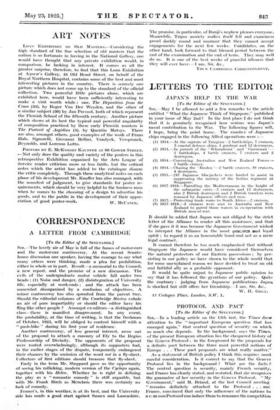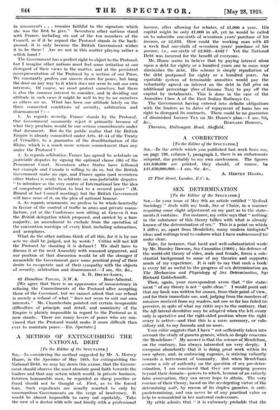PROTOCOL AND PACT
[To the Editor of the SPECTATOR.] SIR,—In a leading article on the 15th inst. the Times drew attention to the " important European question that has emerged again," that central question of security on which so much else depends. In the background, says the Times, of the present European situation lies the chequered history of the Geneva Protocol ; in the foreground lie the proposals for a definite pact between the three most powerful nations of Europe . . . These pact proposals are what really matter."
As a statement of British policy I think this requires most careful consideration. Is it correct to say that the Geneva Protocol lies in the background ? What arc the facts ? The central question is security, mainly French security, and France has clearly stated, and restated, that she recognh.es the guarantee of her security in the Geneva Protocol. " My Government," said M. Briand, at the last Council meeting; " remains definitely attached to the Protocol . . . and, France, convinced that only the adherence of the nations to a ccmrnon Protocol can induce them to renounce the competition
in armaments . . . remains faithful to the signature which she was the first to give." Seventeen other nations stand with France, including six out of the ten members of the Council, so if it be argued the Protocol stands in the back- ground, it is only because the British Government wishes it to be there ! Are we not in this matter playing rather a selfish hand ?
The Government has a perfect right to object to the Protocol, but I imagine other nations must feel some irritation at our disregard of their views in the matter, and at the persistent misrepresentation of the Protocol by a section of our Press. We constantly profess our sincere desire for peace, but bang the door on any way to it which does not seem to suit our own interests. Of course, we must protect ourselves, but there is also the common interest to consider, and in deciding our attitude in such cases it might be well to try to see ourselves as others see us. What has been our attitude lately on the three connected conditions of security, arbitration and disarmament ? :— 1. As regards security, France stands by the Protocol. Our Government summarily reject it primarily because of what they proclaim would be our serious commitments under that document. But do the public realise that the British Empire is already committed under Arts. 42-14 of the Treaty of Versailles, to a guarantee of the demilitarization of the Rhine, which is a much more serious commitment than any under the Protocol ?
2. As regards arbitration, Prance has agreed to arbitrate on justiciable disputes by signing the optional clause (36) of the Permanent Court. Seventeen other States have followed her example and Canada is willing to do so, but the British Government make no sign, and France again (and seventeen other States) is ready to arbitrate on non-justiciable disputes " to introduce as the very centre of International law the idea of compulsory arbitration to lead to a secured peace " (M. Briand at last Council meeting), but the British Government will have none of it, on the plea of national honour.
3. As regards armaments, we profess to be whole-heartedly in favour of the control of traffic in arms and private manu- facture, yet at the Conference now sitting at Geneva it was the British delegation which proposed, and carried by a bare majority, an amendment to exclude from the operation of the convention warships of every kind, including submarines, and aeroplanes.
What do the other nations think of all this, for it is by our acts we shall be judged, not by words ? Critics will not kill the Protocol by shouting it is defunct ! We shall have to discuss it at the next Assembly with reasoned argument, and our position at that discussion would be all the stronger if meanwhile the Government gave some practical proof of their desire to co-operate and of their sympathy with the objects of security, arbitration and disarmament.—I am, Sir, &c.,
S. R. DRURY-LOWE,
42 Hamilton Terrace, N.W. 8. Rear-Admiral.
[We agree that there is an appearance of inconsistency in refusing the Commitments of the Protocol after accepting those of the Covenant, but we cannot admit that our refusal is merely a refusal of what " does not seem to suit our own interests." Mr. Chamberlain pointed out certain insuperable difficulties of principle and detail, and unanimity of the Empire is plainly impossible in regard to the Protocol as it now stands. There are many lovers of peace who are con- vinced that the Protocol would make it more difficult than ever to maintain peace.—En. Spectator.]











































 Previous page
Previous page